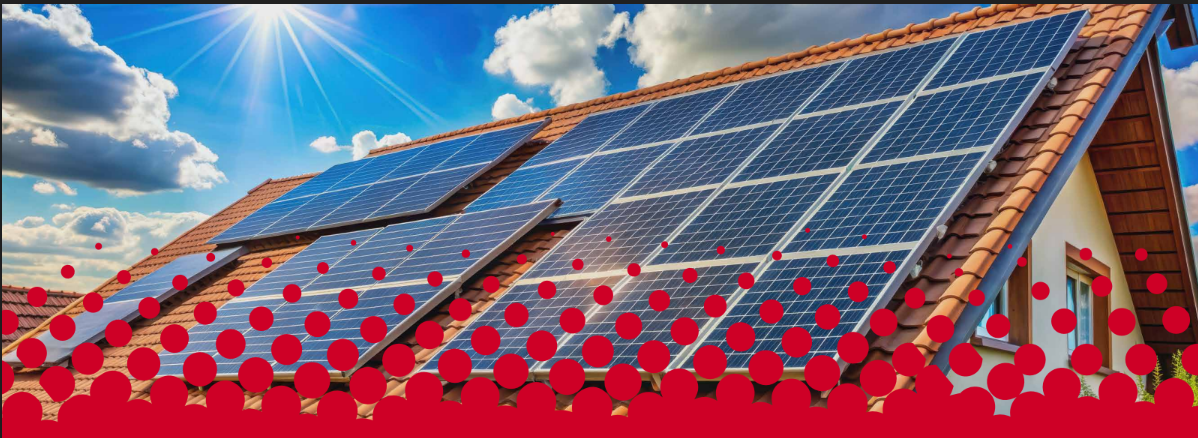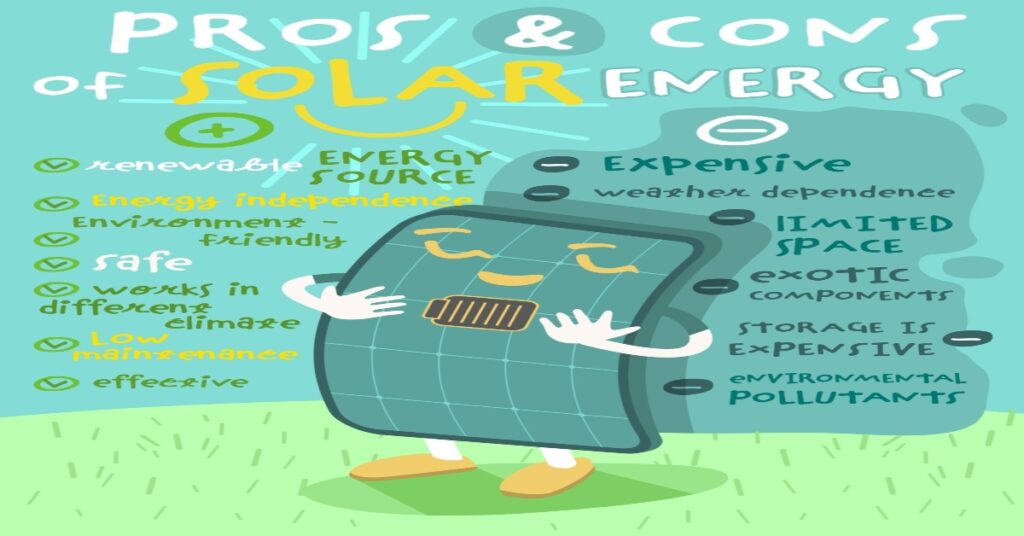Advantages and Disadvantages of Solar Energy

Do you know? India gets approximately 5,000 trillion kWh of solar energy incident every year. If a small amount of the total sunlight incident is converted into electricity, it can meet all of our country’s energy requirements!
As India strives to meet the electricity demands of its growing population and curb its greenhouse gas emissions, it’s now more important for citizens to become aware of solar power advantages and disadvantages. In this article, we will help you understand the solar energy advantages and disadvantages list-wise so that you can decide whether solar is right for you or not. Also you can avail Solar Panel for Housing Society With Zero Installation Cost with NoBrokerHood.
What are the Advantages and Disadvantages of Solar Energy?

Solar Energy has many advantages and disadvantages. Below are the 5 major solar energy advantages and disadvantages list wise, also you can find the detailed description below in order to understand better.
| Advantages | Disadvantages |
| Long-Term Savings | High Cost of Installation |
| Reduces Electricity Bills | Dependence on Sunlight |
| Low-Maintenance Costs | Space Constraints |
| Solar Subsidy | Difficulties in Installation |
| Renewable Source of Energy | Scarcity of Manufacturing Materials |
Advantages of Solar Energy
Here are the major solar energy advantages list wise:
1. Renewable Source of Energy
Power in thermal plants is generated from fossil fuels. But it’s a non-renewable, finite source of energy. Burning fossil fuels releases harmful chemicals and greenhouse gases into the atmosphere which leads to the rise in global temperature.
2. Reduces Electricity Bills
Installing a solar system can significantly reduce your electricity bills. For example, a 1 kW system can generate an average of 4-5 units of electricity daily. The monthly average output will be around 120-150 units.
By checking your monthly electricity consumption, you can calculate how much solar electricity is needed to reduce your bills to zero. For instance, if your monthly electricity consumption is 350 units, you can install a 3 kW solar system and generates around 360-450 units in a month.
3. PM Surya Ghar Subsidy
The central government has launched the PM Surya Ghar: Muft Bijli Yojana to encourage solar system installation across households. This subsidy is available only for on-grid solar systems with ALMM-listed and DCR-certified solar panels. Here ALMM refers to Approved List of Models & Manufacturers and DCR refers to Domestic Content Requirements.
Following is a breakdown of the subsidy available under the scheme:
| Capacity of the Solar System | Subsidy Amount |
| 1 kW | Rs. 30,000 |
| 2 kW | Rs. 60,000 |
| 3 kW or More | Rs. 78,000 |
4. Independence from Power Grid
If you don’t want to rely on your DISCOM for electricity, you can buy solar batteries and install an off-grid solar system. In such a system, you can store power in a battery system and become independent from the utility’s grid. However buying batteries for solar systems is cost-intensive. It will require additional expenditure. So, there are advantages and disadvantages of solar energy with an off-grid system.
5. Increases the Value of Your Home
One of the major advantages of solar panel installation is that it raises the market value of your home at a 4%-5% higher rate. A solar system enhances your home’s marketability. Thus, you can get more from selling your house if it has a solar system.
6. Low-Maintenance Costs
Solar panels don’t require too much maintenance. They usually need to be cleaned once every month with water and a soft brush or cloth to maintain efficiency. To ensure the health of solar panel, it is best to get them checked by a solar expert once in 3 months.
Solar annual maintenance cost is usually between 1% to 2% of the initial installation cost. However, when you install the solar system with NoBrokerHood, you will not have to pay any amount for periodic solar system maintenance.
7. Long-Term Savings
Installing a solar system is a long-term investment. Usually, you can recover your initial investment in 5 to 10 years. For example, if a 3 kW system costs you Rs. 2,00,000, and it generates annual savings of Rs. 35,000, then you can recover your investment in about 5 years and 9 months.
If you get a solar subsidy of Rs. 78,000 for installing the system, the payback period will further reduce. After that, you will enjoy free electricity for over 25 years.
8. Diverse Applications
Solar systems can generate power in places which are difficult to connect with a utility grid. They can generate power in remote areas and also are installed to power satellites in space. Solar systems are also used to distil water in areas with poor supply of clean water.
Other than these, photovoltaics can be integrated into the walls, windows, and facades of buildings to serve the purpose of power generation and upgrading house design. Thus, solar technology is highly versatile and is suited to a variety of applications.
9. Helps the Community
Suppose your solar system generates more electricity than you consume. With net metering, you can export the excess electricity to the DISCOM’s grid and earn electricity credits which can be rolled over monthly. Your extra electricity can help the grid to offset the cost of thermal power generation.
10. Escalating Cost of Electricity
The average electricity tariff for the residential sector is ₹6-8/unit. The cost of producing and buying electricity is likely to increase in the future. To shield yourself against electricity cost inflation, you can install a solar system at your home.
11. Improvement in Technology and Affordability
The technology, power, and efficiency of panels have improved tremendously over the last few years. While the efficiency of monofacial mono-PERC panels is between 20% to 21%, the efficiency of monofacial TOPCon panels is between 21% to 23%.
These panels represent a major improvement from the 12% to 17% efficiency of polycrystalline panels. In some years, the advanced HJT panels will hit the markets as well.
What has also improved with the technology is the affordability of the solar panels. TOPCon panels are priced slightly higher than mono-PERC panels and are highly affordable for most middle-class and lower-middle-class Indians.
Disadvantages of Solar Energy?
Here are the major solar energy disadvantages list wise:
1. High Cost of Installation
The upfront cost of installing a solar system is significant. It includes the cost of all the components such as inverter, solar panels, and wires, and the fees you will pay to the vendor for installing the solar system.
While comparing the solar energy advantages and disadvantages you must consider the fact that though you can get a subsidy for installing DCR-certified solar panels, these solar panels cost high compared to non-DCR panels.
2. Dependence on Sunlight
A solar system is entirely dependent on sunlight for generating electricity. If the weather is cloudy, the power output of a solar system will fall. Moreover, a solar system does not generate power at night. Any obstruction in the path of sunlight, such as shades created by buildings and trees, will lead to a lesser electricity output.
3. Space Constraints
A solar system requires a lot of space. For example, a 1 kW solar system can take up a space of 60 sq. ft. To this, you have to add the area of components such as inverter, battery etc.
The greater the number of panels, the more will be the space required for installing the solar system. If you don’t have sufficient space on your roof, you could install the solar panels on the ground if it has sufficient area.
4. Buying Batteries Leads to Extra Expenditure
If you opt for an off-grid solar system, you have to purchase one or multiple solar batteries, and this will add to the cost of installing the solar system.
5. Difficulties in Installation
Installing a solar system can be difficult on an undulating terrain or on a steep roof. If you want to install the solar panels yourself, you may find it difficult to wire the solar panels and earthing the system.
6. Environmental Impact of Manufacturing and Disposing of Solar Panels
The mining of materials required to manufacture solar panels leads to harmful greenhouse gas emissions. They could have chemicals such as lead and cadmium which can harm the environment if they are not disposed of carefully.
7. Scarcity of Manufacturing Materials
While silicon is abundantly available, other materials required to manufacture solar system equipment may become scarce in the future. It could lead to a shortage in solar technology, and mining for raw materials can further harm the environment.
What is the Future of Solar Energy?
As per the National Institute of Solar Energy, if 3% of the wasteland in India is covered by solar panels, it will lead to a solar power capacity of 748 GW. As of August 2024, India’s solar power capacity stood at 89.4 GW.
Most places in India receive 4-7 kWh of solar energy per square metre daily. However, acquiring land for installing the solar panels can be a challenging task. A solar park can harm the livelihood of local people and disturb the flora and fauna. The social, economic, and environmental aspects are among the major advantages and disadvantages of solar energy.
Solar energy is energy that is harnessed from sunlight. The most common form of solar energy is electricity. Solar electricity is generated when sunlight is incident on photovoltaic (PV) panels. While sunlight is made of photons, PV panels are typically made of crystalline silicon cells.
When the photons in the sunlight strike the electrons in solar cells, the electrons start flowing and solar electricity is generated. When you consider the advantages and disadvantages of solar energy, you must note that solar electricity can also be generated by converting sunlight into heat.
Complete guide to Solar Power:
| How Solar Panels Work | Complete Guide to Solar Energy |
| A Guide to Solar Panel Subsidy |
| Here’s Why Your Society Must Consider Switching to Solar Energy |
| Essential Tips for Solar Panel Maintenance |
Frequently Asked Questions
1. Who Should Install a Solar System?
From individuals and businesses interested in reducing their bills to large companies looking to earn revenue by selling solar power to DISCOMs, anybody with the means to install a solar system would benefit from it.
2. Is it Worth Investing in a Solar System?
You must have a long-term vision for installing a solar system. Ultimately, you must evaluate your own needs and capabilities to judge how much you will benefit from a solar system. A thorough understanding of solar energy advantages and disadvantages is critical to make the right decision
3. Will a solar system generate electricity in the rainy season?
In the rainy season, the power output will be reduced due to lower sunlight because of the clouds.
4. What are the advantages and disadvantages of solar panels?
Solar panels’ major advantage is their low maintenance cost, followed by improvements in technology, power, and efficiency. The cost of installation, installation difficulties, and space constraints are some of the major disadvantages of solar panels.